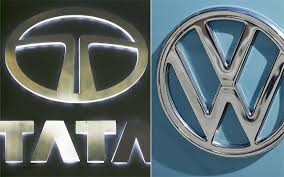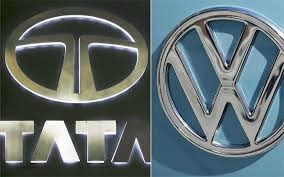
With the aim of jointly developing auto components and vehicles for the Indian subcontinent and beyond, the beleaguered and scam tainted German carmaker Volkswagen said on Friday it had signed a memorandum of understanding to explore a partnership with India's Tata Motors.
After falling behind more nimble rivals such as Maruti Suzuki and Hyundai Motor Co, both automakers look to hit the reset button in India and the announcement of the partnership comes amidst such and business environment and such effort.
And since as the engine offerings of both companies complement each other and would help the alliance match up to competition, a tie-up could be "mutually beneficial" to both Volkswagen and Tata Motors, said Goldman Sachs analyst Pramod Kumar in a note on Thursday.
Its Skoda unit would lead the project, Volkswagen (VW) said.
"The first step will address topics such as the application of specific market knowledge as well as local development expertise," VW said in its statement.
Analysts are of the view that by the year 2020, India is set to become the world's third-largest auto market behind the United States and leader China and therefore it is imperative that car makers made greater headway into the market and according to analysts, the tie-up would provide an opportunity to make more headway into India for VW.
"By offering the appropriate products we intend to achieve sustainable and profitable growth in very different parts of the world," VW CEO Matthias Müller said in the statement.
Since there are rapid changes in customer preferences and the presence of different demand trends across the country, this fastest growing major economy has proven to be a tough market to crack for many foreign automakers.
General Motors and Ford Motor Co are examples of foreign automakers besides VW, which are now pushing exports from the country to use idle manufacturing capacity as they have struggled to ramp up sales in India.
In the Indian auto market, two-thirds of the market is controlled squarely by Maruti Suzuki and Hyundai and it is not the foreign companies alone but even domestic players such as Tata Motors have struggled to quickly adapt to changing demand trends in India.
By launching more modern vehicles, improving efficiencies and streamlining its organization, having faced trouble in recent years with sales, Tata Motors is also trying to turnaround its loss-making domestic business and the partnership comes as the Indian company strives to regain market share.
"This is in alignment with Tata Motors' efforts to make itself 'FutuReady' by embracing new technologies, fostering higher platform efficiency and offering solutions that connect with the aspirations of our customers," managing director Guenter Butschek said in a separate statement on Friday.
Tata Motors said it intended to launch products from the partnership in the Indian market starting in 2019 which is based on a definitive agreement between the two companies where they have plans to begin joint development work.
(Source:www.reuters.com)
After falling behind more nimble rivals such as Maruti Suzuki and Hyundai Motor Co, both automakers look to hit the reset button in India and the announcement of the partnership comes amidst such and business environment and such effort.
And since as the engine offerings of both companies complement each other and would help the alliance match up to competition, a tie-up could be "mutually beneficial" to both Volkswagen and Tata Motors, said Goldman Sachs analyst Pramod Kumar in a note on Thursday.
Its Skoda unit would lead the project, Volkswagen (VW) said.
"The first step will address topics such as the application of specific market knowledge as well as local development expertise," VW said in its statement.
Analysts are of the view that by the year 2020, India is set to become the world's third-largest auto market behind the United States and leader China and therefore it is imperative that car makers made greater headway into the market and according to analysts, the tie-up would provide an opportunity to make more headway into India for VW.
"By offering the appropriate products we intend to achieve sustainable and profitable growth in very different parts of the world," VW CEO Matthias Müller said in the statement.
Since there are rapid changes in customer preferences and the presence of different demand trends across the country, this fastest growing major economy has proven to be a tough market to crack for many foreign automakers.
General Motors and Ford Motor Co are examples of foreign automakers besides VW, which are now pushing exports from the country to use idle manufacturing capacity as they have struggled to ramp up sales in India.
In the Indian auto market, two-thirds of the market is controlled squarely by Maruti Suzuki and Hyundai and it is not the foreign companies alone but even domestic players such as Tata Motors have struggled to quickly adapt to changing demand trends in India.
By launching more modern vehicles, improving efficiencies and streamlining its organization, having faced trouble in recent years with sales, Tata Motors is also trying to turnaround its loss-making domestic business and the partnership comes as the Indian company strives to regain market share.
"This is in alignment with Tata Motors' efforts to make itself 'FutuReady' by embracing new technologies, fostering higher platform efficiency and offering solutions that connect with the aspirations of our customers," managing director Guenter Butschek said in a separate statement on Friday.
Tata Motors said it intended to launch products from the partnership in the Indian market starting in 2019 which is based on a definitive agreement between the two companies where they have plans to begin joint development work.
(Source:www.reuters.com)














